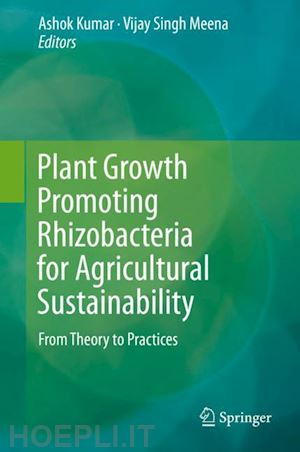
Questo prodotto usufruisce delle SPEDIZIONI GRATIS
selezionando l'opzione Corriere Veloce in fase di ordine.
Pagabile anche con Carta della cultura giovani e del merito, 18App Bonus Cultura e Carta del Docente
To meet the food security needs of the 21st century, this book focuses on ecofriendly and sustainable production technologies based on plant growth promoting rhizobacteria (PGPR). It is estimated that the global population could increase to 9 billion by 2050. Further, the amount of land devoted to farming has decreased. Soil is a living entity, and is not only a valuable natural resource for agricultural and food security, but also for the preservation of all life processes. Agricultural productivity rests on the foundation of microbial diversity in the soil, and in recent years, PGPR have emerged as an important and promising tool for sustainable agriculture.
The injudicious use of agrochemicals by farmers has created a range of negative impacts, not only threatening the environment, but also destroying useful microorganisms in the soil. The efficient use of PGPR reduces the need for these chemicals while simultaneously lowering production costs. In turn, increased yields could provide a more favourable environment and encourage sustainability. This book assesses the impacts of PGPR on crops, environmental and socio-economic sustainability, and demonstrates these ecofriendly technologies’ three critical advantages, namely (a) enhanced crop productivity, (b) reduced application of agrochemicals, and (c) increased incomes for farmers. Besides offering an economically attractive and ecologically sound means of augmenting the nutrient supply and combatting soil-borne pathogens, PGPR play an important part in boosting soil fertility, bioremediation and stress management for the development of ecofriendly and sustainable agriculture.
Dr. Ashok Kumar is an Assistant Professor at the Department of Genetics and Plant Breeding (Plant Biotechnology), Banaras Hindu University (BHU), Uttar Pradesh, India. He received his Ph.D. in Biotechnology from the BHU, where he also completed his doctoral studies. His research chiefly focuses on the effective use of plant growth promoting rhizobacteria (PGPR) for sustainable agricultural development, and on soil-microbe-plant-interactions. He has submitted forty-four bacterial sequences to the NCBI Genebank. Dr. Kumar has served as an editorial board member for the International Journal of Applied Agricultural Sciences and is a lifetime member of the Asian PGPR Society of Sustainable Agriculture and Society and Nature.
Dr. Vijay Singh Meena is currently working as a soil scientist at the ICAR-Vivekananda Institute of Hill Agriculture, Almora, Uttarakhand. He received his B.Sc. from SKRAU, Bikaner, Rajasthan, and his M.Sc. and Ph.D. with a specialization in Soil Science and Agricultural Chemistry from Banaras Hindu University (BHU), Uttar Pradesh, India. He has completed vital work on potassium-solubilizing microbes, soil biological fertility, rhizospheric chemistry, and conservation agriculture, and has published more than 45 original research articles in national and international peer-reviewed journals. In addition, he has published six books and fifteen book chapters.











Il sito utilizza cookie ed altri strumenti di tracciamento che raccolgono informazioni dal dispositivo dell’utente. Oltre ai cookie tecnici ed analitici aggregati, strettamente necessari per il funzionamento di questo sito web, previo consenso dell’utente possono essere installati cookie di profilazione e marketing e cookie dei social media. Cliccando su “Accetto tutti i cookie” saranno attivate tutte le categorie di cookie. Per accettare solo deterninate categorie di cookie, cliccare invece su “Impostazioni cookie”. Chiudendo il banner o continuando a navigare saranno installati solo cookie tecnici. Per maggiori dettagli, consultare la Cookie Policy.